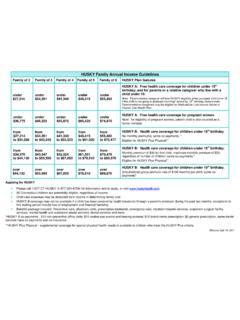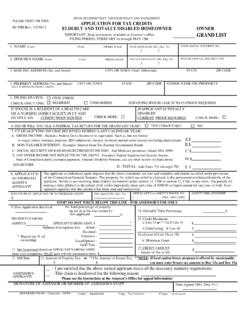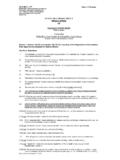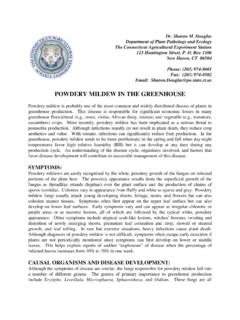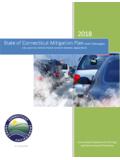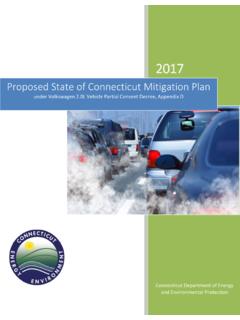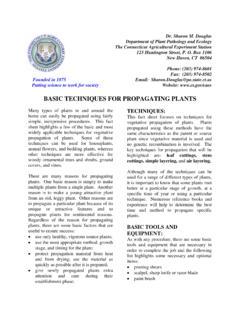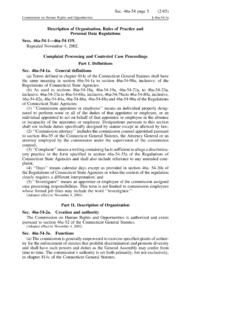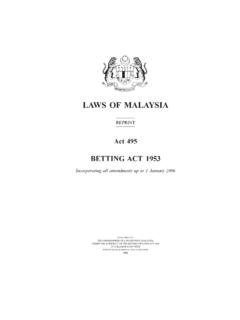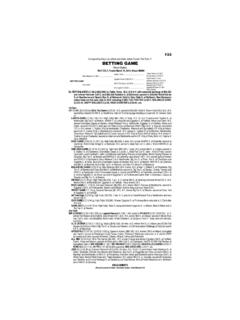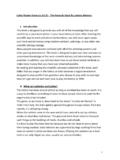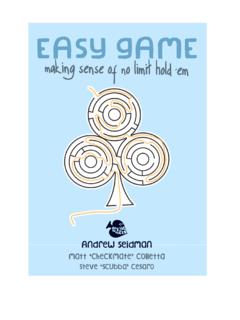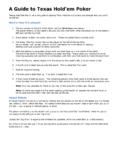Transcription of Problem Gambling Prevention Strategies - Connecticut
1 Problem Gambling Prevention Strategies for Addictions & Mental Health Treatment Facilities Problem and compulsive Gambling often co-occur with substance abuse and mental health disorders. The most conservative estimates suggest about 14% of adults in mental health and substance abuse treatment meet the diagnostic criteria for pathological Gambling , and an additional 15% meet the criteria for Problem Gambling . Despite the high prevalence rate of Problem gamblers in these settings very few are ever identified and treated. Less than one tenth of one percent of past year clients at DMHAS funded agencies were given the diagnosis of pathological Gambling . Problem Gambling is a significant impediment to recovery and in severe cases leads to serious financial, social, vocational, family, legal, spiritual and health problems.
2 For a recovering person, any Gambling that distracts from the hard work of recovery, increases stress, or negatively impacts personal resources should be considered problematic. We recommend that administrators and staff educate themselves and their clients, and examine all formal and informal Gambling policies in order to prevent clients from developing or exacerbating Gambling problems at any stage of their recovery. Remember: It is important to talk about Gambling , what it is, and how it impacts individuals. Each person has his or her own view of Gambling derived from their culture, family of origin, and personal experience. Gambling is not inherently good or bad . Some individuals are more vulnerable to developing problems than others.
3 Some forms of Gambling are more dangerous than other forms. For example, Gambling on credit with a bookie or at a casino is much riskier than penny-ante poker with friends. However even a small stakes game with friends can lead to participation in higher risk forms. For clients in mental health and addiction treatment settings Gambling and resulting risky behaviors can put their recovery in jeopardy. For STAFF, IT IS NOT To participate in any Gambling activities, such as sport pools or lottery ticket play, while on duty. To share personal Gambling stories with, or within earshot, of clients. This includes sports betting and lottery play. To wear apparel or accessories that advertise Gambling venues or activities. To allow clients to purchase lottery tickets while in the care of a caseworker or on a supervised outing of any kind.
4 (Would you drive a client to the liquor store to purchase alcohol?) For CLIENTS IN RECOVERY, BE Social and recreational Gambling are not risk free . Gambling stimulates an adrenaline high and leads to neuro-chemical changes in regions of the brain associated with pleasure and judgement. For some gamblers the high kills emotional pain, changes mood and self-concept, and serves as a powerful distraction from the demands of living. Some drug users compare the Gambling high to that induced by cocaine. Bingo and lottery scratch-off tickets are forms of Gambling . So are betting on pool games, cards and raffles. Gambling opportunities are present in many kinds of settings, and Gambling is a popular activity among recovering people.
5 For example, bingo and other charitable games are featured at church fundraisers, and raffles are common in 12 Step programs, such as While raffles at 12-step meetings are not a Problem for most people, they can be an impediment for individuals struggling to abstain from Gambling . Casinos and other Gambling venues are often drinking environments , offering free drinks to anyone who is actively Gambling . For PROGRAM ADMINISTRATORS, EXAMINE Is your staff adequately trained to recognize, assess and refer Problem gamblers? What about your part-time, third shift, and weekend staff? How well are the evening, weekend, and other less structured times monitored for Gambling activities? Be clear about your definition of Gambling with different recreational games that rely on dice, such as Yahtzee, and card games.
6 Dice and cards can be triggers for some people. Once you ve raised awareness of Gambling and its impact on recovery, it may help to ask participants to consider whether handling dice or cards has ever been associated with problems in their lives. What alternative social and recreational activities do you promote for your clients? Clients often have a difficult time imagining life without substance use, which makes it important to inform about safe alternatives, including alternatives to Gambling . Do you promote, allow, or ignore staff sport betting pools? If so, are clients allowed to observe or participate? What policies do you have in place governing staff Gambling behavior on the job? Has the staff been educated about the rationale behind these policies?
7 Given that many staff members may be in recovery, raising awareness about the risks of Gambling participation, and establishing and enforcing workplace policies should have preventative value. Problem Gambling SPECIALISTS RECOMMEND THAT STAFF IN ADDICTIONS AND MENTAL HEALTH Review all policies on Gambling activities and the possession of Gambling paraphernalia. Policies should be clear, enforced, and address staff Gambling activities as well as those of the clients . (Policy example: Client or staff wagering or betting on any activity, game, pool, or sports event, is prohibited. Staff should refrain from discussing or sharing information on their own or others wagering activities while on duty.) Screen for pathological Gambling on intake.
8 Refer clients with pathological Gambling to a Problem Gambling specific treatment program or therapist as a component of aftercare. Provide training and education programs for staff on Problem and pathological Gambling , including signs and symptoms of Problem Gambling , co-occurring disorders, assessment, and referral skills. Ensure all staff participate in the training, including part-time, third shift, and weekend staff. Provide information and education for clients on Problem and pathological Gambling , the links between Gambling and other addictive behaviors, and how to develop alternative social and recreational activities. Provide information on how to access help for a Gambling Problem for themselves or someone they care about. Include Problem Gambling information along with mental health and substance abuse information provided to family members.
9 As with other addictions, pathological Gambling impacts the whole family. Family members have important needs to address, and involving them is a critical piece of the recovery process. Raise the level of awareness about Problem and pathological Gambling and encourage abstinence as the safest alternative. - These guidelines were prepared by Prevention Services of the DMHAS Problem Gambling Services, with assistance and support from the Bettor Choice clinicians and Problem Gambling specialists. Guidelines may be reproduced without permission. Please cite Prevention Services of DMHAS Problem Gambling Services as the source.
